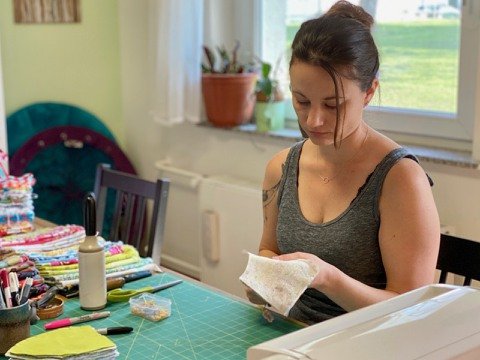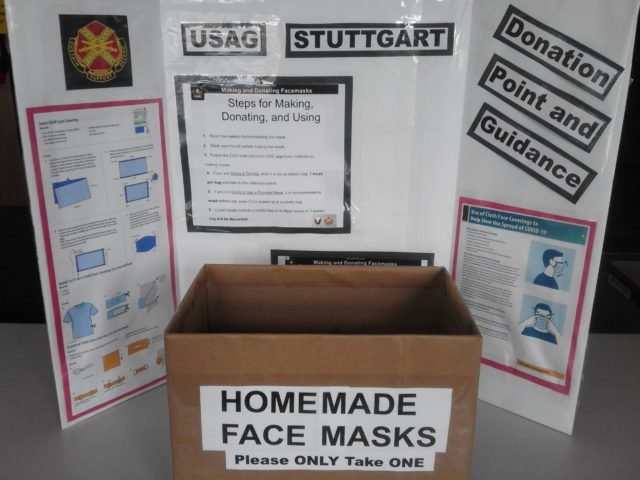By Mac Hightower, U.S. Army Garrison Stuttgart (public affairs volunteer)

Like many people living at U.S. Army Garrison Stuttgart these days, Erin Hyde has been at home, watching Facebook group posts on the new coronavirus.
Hyde recently saw a fellow military spouse asking for elastic – apparently, she was unable to find the material online or in stories. As it turns out, Hyde was sitting on a gold mine.
“I basically had two closets worth of fabric and elastic from over the years,” said Hyde, describing her treasure trove of craft supplies, accumulated from her 15-year sewing hobby.
Recent guidance from the U.S. Centers for Disease Control and Prevention and the U.S. Department of Defense, coupled with USAG Stuttgart messages, highlight face coverings as a best practice during the coronavirus, or COVID-19, outbreak – especially for the high-risk populations.
Many community members with sewing skills have begun fabricating face coverings. The American Red Cross set up drop boxes for donated face coverings at each of the four commissaries at USAG Stuttgart.
Hyde first donated a large amount of her own material to others working to make masks on post. She kept some for herself.
“I thought, ‘well, I sew, I could make masks too,’” Hyde said.
Hyde works at Child/Youth Services, part of the garrison’s Family and Morale, Welfare and Recreation directorate. CYS provides programs and services for children of military and civilian families, to include child care, classes and other activities. Through her work with families on post, Hyde knows first-hand how many kids are high-risk, she said,
“I felt a sense of responsibility,” Hyde explained.
Growing up in Columbia, Maryland Hyde enjoyed sewing and knitting. Later, she used the hobby to cope with obsessive compulsive disorder and anxiety. Reading about COVID-19 recently hasn’t been easy, she said. In fact, she describes “going down these rabbit holes” leading her to a world where “everything’s not going to be OK.”
She felt worried. She felt nervous. She felt “waves of dread.”
Isolated at home early with her son, Hyde looked for things to pass the time – anything that she enjoyed. She began exercising and found things to be thankful for.
Then she saw the post. Moms, like her, were looking for supplies to sew masks. And for Hyde, sewing works as a coping mechanism.
“It’s meditative to do something over and over again,” Hyde said, adding that directing her hobby toward vital face coverings for the community helps her feel productive
Hyde’s husband, Steven, is a mission-essential service member who works at Kelley Barracks. She often goes out her way to help others, he said.
“It’s no surprise to me that Erin’s extreme generosity merged with her passion for crafting during the COVID-19 pandemic, to assist her neighbors on Robinson Barracks,” Steven Hyde said.
Her face coverings have two layers of quilting cotton sandwiched between a layer of flannel. The materials are breathable but aim to keep out droplets. She’s already made about 30 of them. Offered online, Hyde drops them outside people’s doors, to maintain distancing.
Community members have medical appointments, mission-essential jobs, and other obligations that they simply cannot miss, Hyde said. She reminds people her masks are not medical grade, but something is better than nothing.

If you would like to donate, or require a mask, please ensure you follow the guidance below.
1. Wash the material before making the mask.
2. Wash your hands before making the mask.
3. Follow the CDC instructions for CDC approved methods on making masks
4. If you are going to donate, seal in a zip-up plastic bag, 1 mask per bag and take to the collection points.
5. If you are going to use a donated mask, it is recommended to wash before use, even if it is sealed up in a plastic bag.
6. Loose masks outside a plastic bag or multiple masks in 1 sealed bag will be discarded
